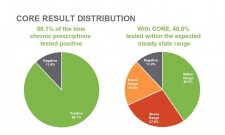Cordant Core — the Next Generation of Medication Monitoring

DENVER, May 1, 2019 (Newswire.com) - Cordant Health Solutions™, a provider of innovative tools for monitoring and managing behavioral health and chronic pain patients through its unique pharmacy and drug testing programs, released data today detailing how a patented medication monitoring test, Cordant CORE™, can supply greater insight than a traditional drug test.
“The issue that we face in the pain management world is the limited ability to understand if patients are actually taking their medications as directed,” said Anthony Mimms, MD, physician and owner of Mimms Functional Rehabilitation. “Previously, all we had for non-invasive testing was standard urine or oral fluid options, where the assumption was that a positive result for a prescribed medication meant everything was good with the patient. Most pain providers test their chronic pain patients regularly to make sure patients are taking their medication, or that they are not taking something else that could create a lethal combination.”
Until CORE, most physicians were not able to distinguish between patients taking only some of their medication and patients taking their medication as prescribed. The CORE test is the first patient‑monitoring tool to use saliva samples to determine if a medication is present at a level consistent with the prescribed dosing regimen.
“In comparison, urine drug tests cannot provide this level of information or detail. They simply report the presence or absence of a drug, not if it is being taken consistently as prescribed or if there are metabolic issues occurring and more investigation is needed,” said Richard Stripp, Ph.D., chief scientific and technical officer at Cordant.
In the fourth quarter of 2018, Mimms integrated CORE drug testing into his clinic’s medication monitoring protocol, which previously had only included standard urine drug testing.
Data released from Mimms’ practice illustrates the difference between traditional drug testing and CORE testing. Oral fluid samples were collected and tested from 281 of his patients prescribed opioids. From a traditional testing perspective, 88.1 percent of samples tested were classified as positive for the prescribed opioid, meaning the medication was present in the patient’s system at the time of collection.
However, when the same samples were tested using CORE, only 40.5 percent of patient results fell within the expected range, meaning the positive result was at a level consistent with the prescribed dosing regimen. The other 47.6 percent of patients who tested positive with the traditional test were found to be below (19.8 percent) or above (27.8 percent) their expected range using CORE.
In other words, more than half of patients who showed positive results with the traditional test were found to be out of range with their prescribed medication regimen using the CORE test, which helps determine not just whether a drug is present but whether it is present at a level consistent with the prescribed dosing regimen for that patient.
“CORE opens up a discussion between clinician and patient. These results show that 47.6 percent of patients previously thought to be following Dr. Mimms’ treatment plan actually fell outside the expected range,” said Stripp. “We often find that patients with unexpected results are taking their medication on an as-needed basis, rather than consistently. Their physician can use this information immediately to help educate the patient, make changes to their medication routine or talk to them about other treatments options that might work better for their pain.”
Mimms’ CORE data is very similar to what Cordant is seeing nationwide with clinicians who use CORE testing. “Most of the time in a pain practice, close to 75–80 percent of chronic pain patients test positive for their prescribed medication with traditional testing, meaning their result is considered consistent with expectations. But when clinicians start using CORE testing, that consistent group falls to around 35 percent who test within the expected range.
“CORE is an evolutionary step in drug testing because it gives more specific information than urine or standard oral fluid tests. Knowing which patients are departing from their prescription regimen gives me a natural opening for a productive conversation with the patient about how and when they take their medication,” said Mimms. “Most often the patient has just misunderstood the plan and the correction is relatively simple. CORE results give me the opportunity to take a situation that I wouldn’t otherwise have known was problematic and turn it into one that supports the patient’s health.”
About Cordant
Based in Denver, Cordant Health Solutions™ (www.cordantsolutions.com) provides innovative tools for monitoring behavioral health, chronic pain and criminal justice cases. Our unique pharmacy and drug testing programs provide accurate, actionable results to protect prescribers, hold patients accountable and optimize quality of life.
As a leader in quality standards, Cordant is committed to developing solutions for payers, clinicians and organizations involved with substance use disorder, pain management and criminal justice agencies. Cordant is one of the only healthcare companies that offers monitoring and risk assessment tools through its innovative drug testing options and full-service, high-touch pharmacies, which specialize in the complex management and dispensing of controlled substances. Cordant’s testing protocols and digital case-management tools help clients become more efficient and effective in using drug testing programs to monitor patient adherence, reduce risk and improve patient outcomes.
MEDIA CONTACT
Tiffany Tuetken
303-570-4585
Source: Cordant Health Solutions
